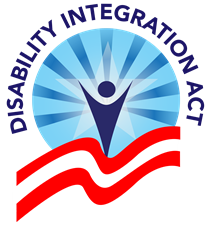Twenty-eight years after the signing of the Americans with Disabilities Act (ADA) of 1990, unwanted institutionalization remains a serious problem for people with disabilities and seniors. This issue was documented in the HELP Committee report (July 2013): “Separate and Unequal: States Fail to Fulfill the Community Living Promise of the Americans with Disabilities Act”.
That report recommended that Congress amend the ADA to clarify and strengthen the law’s integration mandate in a manner that accelerates Olmstead implementation and clarifies that every individual who is eligible for LTSS under Medicaid has a federally protected right to a real choice in how they receive services and supports. The report and this recommendation were well received by the Disability Community.
Although the Disability Integration Act (S.117, H.R.555) does NOT amend the ADA, the legislation, modeled on the ADA and the ADA Amendments Act, strengthens Olmstead’s integration mandate and creates federal civil rights law which addresses the civil rights issue that people with disabilities who are stuck in institutions cannot benefit from many of the rights established under the ADA.
